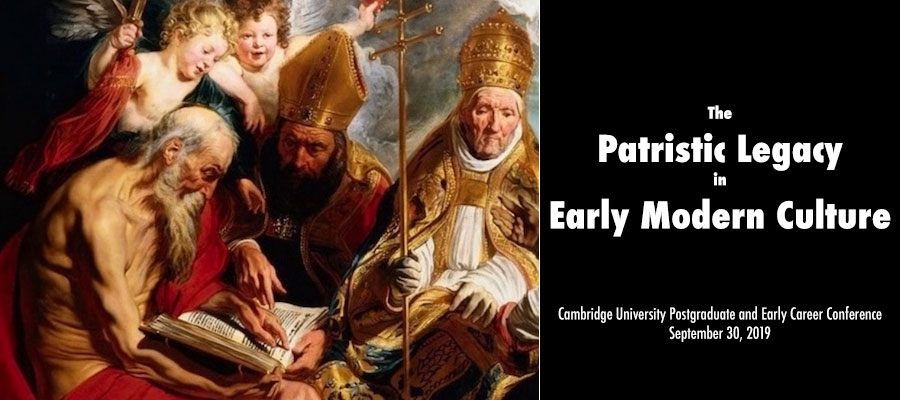The Patristic Legacy in Early Modern Culture, Cambridge University Postgraduate and Early Career Conference, September 30, 2019
In recent decades, our understanding of the early modern period has been transformed by close attention to the legacy of the Church Fathers. Under the label ‘Renaissance’, the years c. 1400–1700 were long defined in relation to an apparent renewal of interest in the secular texts of ancient Greece and Rome. Now, however, it is clear that early modern intellectual culture owed at least as great a debt to religious, and in particular patristic, texts.
The transmission of patristic learning was never straightforward; aspects of the Fathers’ works were constantly manipulated, reinterpreted, or ignored. Scholars from diverse disciplinary backgrounds have contributed to the recovery of this complex, multifaceted story.Intellectual historians and theologians have emphasised the ways in which the writings of the Church Fathers served as competing authorities within theological debates, provided tools for research in the developing field of Biblical scholarship, or sources for the knowledge of pagan antiquity. Scholars of classics and political thought have traced the Fathers’ enduring influence as sources of arguments and models of style for written texts and orations. Nor was the reception of the Church Fathers purely of relevance to the elite: as studies of literature, art and cultural history have revealed, patristic writings furnished rich sources to pioneers of the theatre and visual arts, and their wide dissemination influenced the devotional practices of the laity.
Despite these rich and varied developments in the field, the need to bring together insights from separate academic disciplines has only slowly been recognised. Our one-day conference aims to give young scholars an opportunity to bridge the gaps between disciplines. We invite doctoral candidates and early career scholars from the fields of history, divinity, classical studies, literature and art history to present their work to a multidisciplinary audience. Panels will be arranged by theme, to shed light on the diverse ways similar questions have been approached by scholars from different areas.
Professor Karla Pollmann, whose outstanding work in the field has consistently transgressed disciplinary boundaries, will give a keynote lecture, entitled ‘We are what we read or we read what we are? The reception of Augustine of Hippo as a case-study’.
Suggested topics for discussion include (but are not limited to):
- The changing prominence of different fathers in the patristic ‘canon’
- The production of new editions and translations of patristic texts; the importance of Greek, Hebrew and linguistic erudition; ways in which early modern editing choices affect patristic scholarship today
- Ways in which the relationship between the Fathers and pagan antiquity was understood; the importance placed (or not placed) on biographical knowledge of the Fathers
- The role of patristic authority in early modern religious controversies; ways in which contradictions between Fathers were negotiated and exploited; early modern use of Fathers as a normative source for present practice
- How far patristic scholarship was driven by ideals of objectivity or confessional polemic
- The role of Jews and other non-Christians in interpreting the Church Fathers
- The influence of patristic scholarship on early modern beliefs about sacred and secular history
- The patristic legacy beyond the elite; the popular presence of the Fathers; patristic reception amongst women
- Examples of the Fathers being ignored, forgotten or undermined
- Methodological papers exploring fault-lines between disciplines and what patristic scholars can learn from other disciplines; how interdisciplinary cooperation (or lack thereof) affected understandings of the patristic legacy to date
